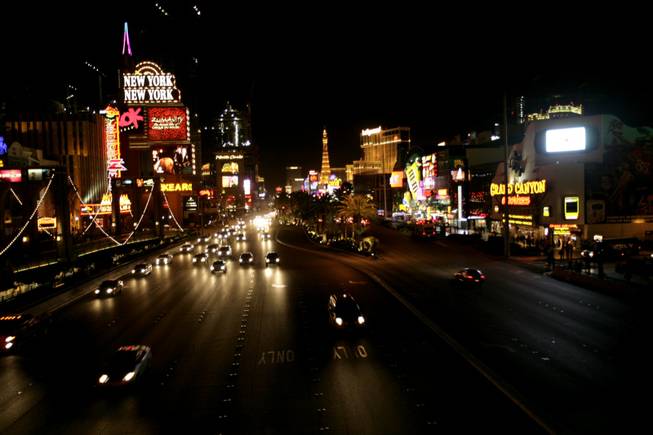
Las Vegas, like Detroit, has been hit hard by the economic downturn, creating layoffs and reduced hours at casinos. But unlike the Big Three automakers, Las Vegas’ casino bosses won’t be headed to Washington to beg for a bailout.
Monday, Dec. 8, 2008 | 2 a.m.
The debate over the proposed federal bailout of Detroit’s Big Three automakers raises some intriguing comparisons with the industry behind our own company town.
Las Vegas has been called the “last Detroit.” And the Strip is indeed a modern union success story.
The U.S. automakers say the failure of the country’s largest remaining manufacturing base could spark a depression.
Job cuts and lost wages mean less money to buy goods and services, which results in fewer car sales, continuing a vicious cycle, says the Center for Automotive Research, a Michigan-based nonprofit that receives taxpayer and industry funding.
The same could be said of gaming and Las Vegas, which, like Detroit, has been hard hit by the downturn. Casino layoffs and reduced work hours are affecting nearly every sector of the local economy, including forcing the state, with 50 percent of general fund tax revenue coming from casinos, to cut one-third of its budget.
Before the economic decline, both car and casino companies had a bigger-is-better mentality. When gas was cheap, Americans flocked to gas-guzzlers and carmakers responded with more SUVs and large trucks. In Las Vegas, developers loaded up on cheap debt from Wall Street to create larger, more elaborate properties preferred by well-to-do hordes.
The Center for Automotive Research says 352,341 Americans were employed in the auto industry as of September, 239,341 of them at the Big Three automakers. Including auto parts manufacturers, that total rises to about 732,800.
U.S. casinos employed more than 706,000 people at the end of 2007, which includes estimates from the American Gaming Association and Applied Finance Group, which compiles tribal casino figures. Gaming manufacturers employ more than 28,000 worldwide.
Under a worst-case scenario, the Center for Automotive Research estimates that suspended operations at the Big Three could cost nearly 3 million jobs in the first year, including 973,969 jobs with suppliers and other indirect sources and 1.7 million “spinoff” jobs. Even a 50 percent reduction in operations would cost 2.5 million jobs and $50 billion in lost tax revenue near-term, the group says.
The American Gaming Association doesn’t have figures on the industry’s multiplier effect, but Applied Finance estimates that tribal gambling generates 732,000 direct and indirect jobs and $29.4 billion in wages.
About 22 percent of Michigan’s workforce depends on the auto industry, compared the 26 percent of working Nevadans employed in the leisure and hospitality sectors and 16 percent working directly in gaming.
Wages paid by auto and parts manufacturers, suppliers and car dealers in Michigan totaled $44.7 billion in 2007 versus $7.2 billion in wages paid by Nevada’s gaming industry, according to the U.S. trade association Auto Alliance and Applied Analysis, a Las Vegas consulting firm.
As with the big carmakers, there’s a possibility that one or more major casino companies will enter bankruptcy — the most highly leveraged of them are burning through the cash needed to pay their bills. After a certain point, casinos can’t cut staff, their largest expense, or business will suffer even more.
Gov. Jim Gibbons has asked Washington to help Nevada get through the downturn.
Still, casino bosses won’t be heading to Washington to beg for a bailout.
One reason is it could open the door to unwanted scrutiny from the feds, who have long had a dim view of gambling, a state-regulated activity.
Automakers argue that people won’t buy cars from companies under bankruptcy court protection. Yet many casino bankruptcy reorganizations have occurred with tourists unaware that buildings have changed hands.
Most important, though, the public likely views troubled casinos with apathy.
Gambling is often considered a sin industry, while the country’s industrial flagship is a source of national pride for many Americans.

Join the Discussion:
Check this out for a full explanation of our conversion to the LiveFyre commenting system and instructions on how to sign up for an account.
Full comments policy